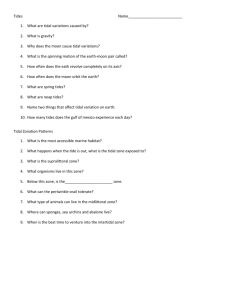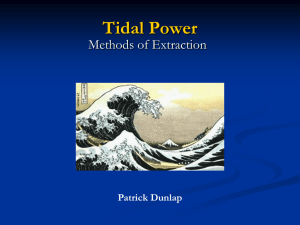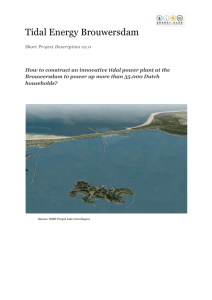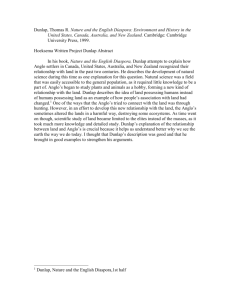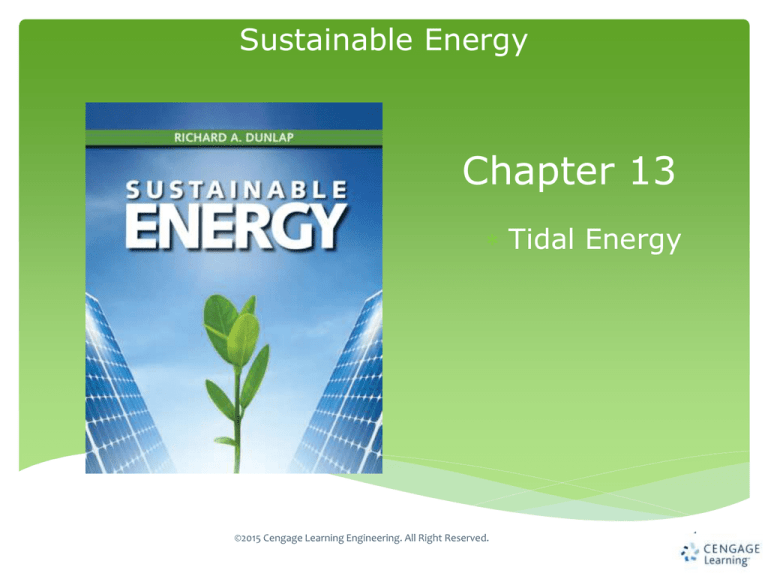
Sustainable Energy
Chapter 13
Tidal Energy
©2015 Cengage Learning Engineering. All Right Reserved.
1
Sustainable Energy
Dunlap
Learning Objectives
●
●
●
●
●
●
●
The reasons for tidal motion and resonance effects
in enclosed basins.
The energy associated with tidal movement.
The design of barrage systems.
The availability and utilization of tidal energy based
on barrage systems.
Environmental and other factors that affect the
viability of barrage systems.
The design of tidal current energy systems.
Experimental and commercial tidal current
systems.
©2015 Cengage Learning Engineering. All Right Reserved.
2
Sustainable Energy
Dunlap
Tidal energy
Tidal energy is a manifestation of the
gravitational interaction between the oceans
and the moon and the sun.
The principal component of the tidal period is
the diurnal period and is determined by the
lunar day (12h 25m).
Gravitational interaction of the sun complicates
tidal movements.
©2015 Cengage Learning Engineering. All Right Reserved.
3
Sustainable Energy
Dunlap
Diurnal tidal period and effects of solar
position
©2015 Cengage Learning Engineering. All Right Reserved.
4
Sustainable Energy
Dunlap
Diurnal, semidiurnal and mixed tides
©2015 Cengage Learning Engineering. All Right Reserved.
5
Sustainable Energy
Dunlap
Resonance effects in enclosed basins
The period of tidal motion can be near the
resonant period of a basin.
This can cause a substantial increase in
tidal range.
©2015 Cengage Learning Engineering. All Right Reserved.
6
Sustainable Energy
Dunlap
Resonance effects in a tank of water
Generating waves with a period equal to the
natural period of the tank will increase wave
amplitude
©2015 Cengage Learning Engineering. All Right Reserved.
7
Sustainable Energy
Dunlap
Extreme tides in the Bay of Fundy
©2015 Cengage Learning Engineering. All Right Reserved.
8
Sustainable Energy
Dunlap
Analysis of tidal power
The volume of water that cycles through a tidal
basin during one period is
the factor of two is from the rising and falling of
the tide
The mass of this water is
©2015 Cengage Learning Engineering. All Right Reserved.
9
Sustainable Energy
Dunlap
Gravitational energy and tidal power
The gravitational potential energy is therefore
and the average power over one tidal period is
©2015 Cengage Learning Engineering. All Right Reserved.
10
Sustainable Energy
Dunlap
Tidal barrage systems
©2015 Cengage Learning Engineering. All Right Reserved.
11
Sustainable Energy
Dunlap
Sluice gates
Sluice gates allow water to be trapped inside or outside the basin
©2015 Cengage Learning Engineering. All Right Reserved.
12
Sustainable Energy
Dunlap
Gated turbines
Turbine gates allow water to flow through the turbines
when the water on the two sides is at different levels
©2015 Cengage Learning Engineering. All Right Reserved.
13
Sustainable Energy
Dunlap
Ebb generation scheme
Water is trapped in the basin and is allowed to flow
out into the ocean when the ocean level is lower
©2015 Cengage Learning Engineering. All Right Reserved.
14
Sustainable Energy
Dunlap
Flood generation scheme
Water is not allowed to enter the basin as the ocean level
rises and then is allowed to flow into the basin when the
ocean level is higher
©2015 Cengage Learning Engineering. All Right Reserved.
15
Sustainable Energy
Dunlap
Capacity factor
Because the water is raising or lowering on the other
side of the barrage as it is flowing through the
turbines, only about half of the available energy can
be extracted.
In a one directional flow scheme power is generated
only during half of the tidal cycle.
These two factors yield a typical net capacity factor
of about 25%.
A bidirectional flow scheme is slightly better.
©2015 Cengage Learning Engineering. All Right Reserved.
16
Sustainable Energy
Dunlap
Operational barrage systems Rance River, France
The first major barrage system to become operational (1966)
was on the Rance River, France (rated at 240 MWe)
©2015 Cengage Learning Engineering. All Right Reserved.
17
Sustainable Energy
Dunlap
Rance River turbine design
Rance River uses horizontal Kaplan-type turbines as are
commonly used for low head applications
©2015 Cengage Learning Engineering. All Right Reserved.
18
Sustainable Energy
Dunlap
Annapolis Royal, Nova Scotia
20 MWe rated capacity became operational in 1984
©2015 Cengage Learning Engineering. All Right Reserved.
19
Sustainable Energy
Dunlap
Sihwa, South Korea
Recently, a 254 MWe tidal barrage system became
operational in South Korea (Sihwa Tidal Power
Plant).
©2015 Cengage Learning Engineering. All Right Reserved.
20
Sustainable Energy
Dunlap
Environmental consequences of tidal
barrages
Possible adverse effects include:
• Changes in tidal range outside basin because of
changes in resonant period
• Effects on navigation
• Effects on fish and marine mammal movement
• Effects on sediment transport
©2015 Cengage Learning Engineering. All Right Reserved.
21
Sustainable Energy
Dunlap
Non-barrage tidal power systems
Tidal lagoons
Artificial enclosures which take the place of natural
basins
©2015 Cengage Learning Engineering. All Right Reserved.
22
Sustainable Energy
Dunlap
Proposed tidal lagoon facility - Swansea, UK
Bidirectional generation scheme
©2015 Cengage Learning Engineering. All Right Reserved.
23
Sustainable Energy
Dunlap
Underwater turbines
Power per unit rotor area follows along the lines
of derivation for wind turbines
(C = capacity factor)
P/A= (1/2) Cρv3
Major difference is density of water (sea water
1025 kg/m3) compared with air (1.204 kg/m3).
Larger capacity factor than for wind turbines because of
more predictable tidal currents (compared with wind).
©2015 Cengage Learning Engineering. All Right Reserved.
24
Sustainable Energy
Dunlap
Operational tidal turbine at
Strangford Lough, Northern Ireland
rated at 1.2 MWe
©2015 Cengage Learning Engineering. All Right Reserved.
25
Sustainable Energy
Dunlap
Location of Strangford Lough Tidal Turbine
©2015 Cengage Learning Engineering. All Right Reserved.
26
Sustainable Energy
Dunlap
Tidal turbine projects
Some tidal Power Plant locations under
consideration
• Bay of Fundy, Nova Scotia, Canada
• Puget Sound, Washington, USA
©2015 Cengage Learning Engineering. All Right Reserved.
27
Sustainable Energy
Dunlap
Shrouded Turbines
Shrouded Turbines direct water into turbine and may be
suitable for underwater devices
©2015 Cengage Learning Engineering. All Right Reserved.
28
Sustainable Energy
Dunlap
Tidal fences
Barrage with open turbines to allow water to flow freely in
locations of extreme tidal currents
©2015 Cengage Learning Engineering. All Right Reserved.
29
Sustainable Energy
Dunlap
Location of possible tidal fence project
Mouth of Severn, UK
©2015 Cengage Learning Engineering. All Right Reserved.
30
Sustainable Energy
Dunlap
Summary
• Tidal energy results from the gravitational interaction
between the oceans and the moon and sun
• Greatest tidal range exists in resonant basins
• Barrage systems trap water from tidal movements
inside or outside a basin
• Power is generated when water is allowed to flow
through gated turbines
• Barrage systems have potential environmental
consequences
• Tidal turbines are in the early stages of commercial
development in several areas
©2015 Cengage Learning Engineering. All Right Reserved.
31

